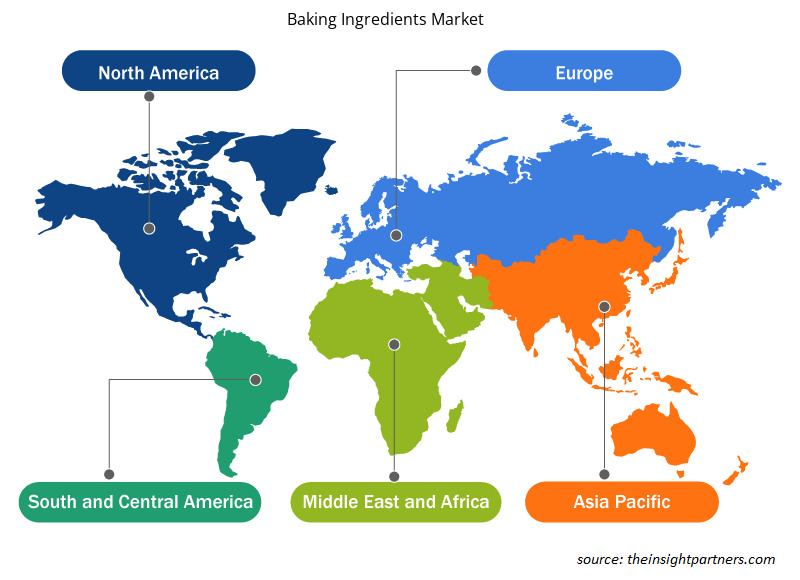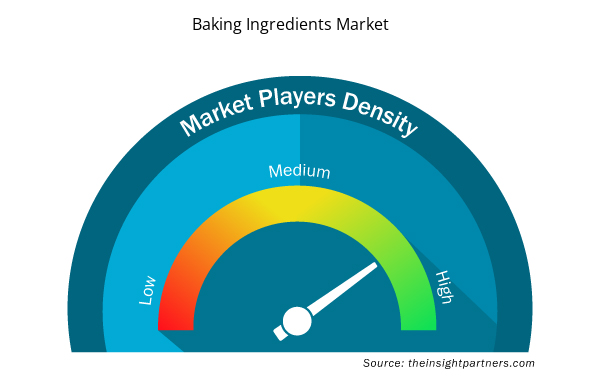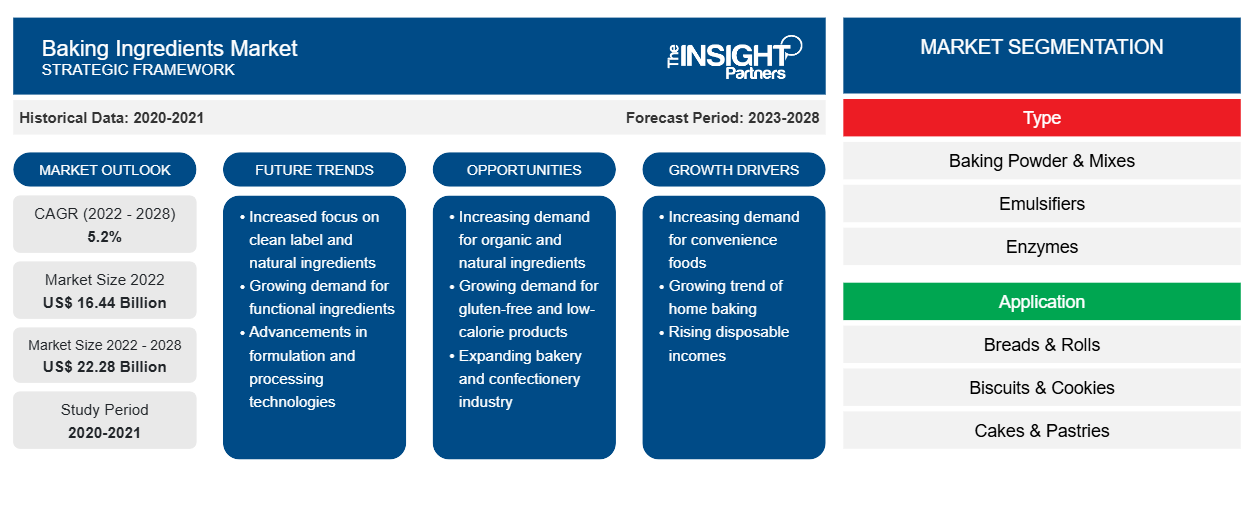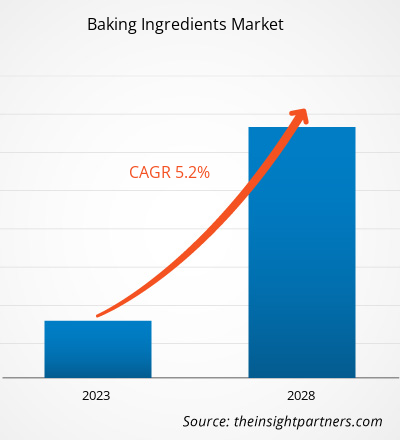Se proyecta que el mercado de ingredientes para hornear alcance los US$ 22.278,10 millones para 2028 desde los US$ 16.444,97 millones en 2022; se espera que crezca a una CAGR del 5,2% entre 2022 y 2028.
Los ingredientes para hornear incluyen harinas y premezclas, edulcorantes, agentes vivaces, levadura, grasas, emulsionantes, manteca vegetal, enzimas, sabores, colorantes e inclusiones. Estos ingredientes juegan un papel específico en la calidad de los productos de panadería. Por ejemplo, la levadura proporciona volumen a los alimentos horneados y hace que los productos sean suaves, ligeros y esponjosos. La manteca vegetal y las grasas mejoran la textura y la fuerza de la masa. Los sabores y colorantes mejoran el sabor y el atractivo visual de los productos de panadería . La creciente demanda de productos de panadería, especialmente pasteles, galletas y productos horneados dulces, debido a la creciente tendencia del consumo indulgente, está impulsando el crecimiento del mercado de ingredientes para hornear.
Se prevé que el mercado de ingredientes para hornear de Oriente Medio y África crezca a la tasa de crecimiento anual compuesta más rápida durante el período de pronóstico. La región ha sido testigo de un cambio en las condiciones socioeconómicas debido a los rápidos desarrollos económicos y al aumento de los ingresos disponibles. Además, la rápida urbanización, el estilo de vida moderno y el aumento de la capacidad de gasto han cambiado los hábitos generales de compra y los patrones de consumo de alimentos de las personas. La creciente influencia de la cultura occidental, especialmente entre la población joven, está transformando los hábitos de consumo. Existe una creciente preferencia por los productos alimenticios de conveniencia que se consumen sobre la marcha. La demanda de productos de panadería aumenta debido a su asequibilidad y facilidad de consumo. Estos factores contribuyen al crecimiento de la industria de la panadería, impulsando así el crecimiento del mercado de ingredientes para hornear en Oriente Medio y África.
Personalice este informe según sus necesidades
Obtendrá personalización en cualquier informe, sin cargo, incluidas partes de este informe o análisis a nivel de país, paquete de datos de Excel, así como también grandes ofertas y descuentos para empresas emergentes y universidades.
- Obtenga las principales tendencias clave del mercado de este informe.Esta muestra GRATUITA incluirá análisis de datos, desde tendencias del mercado hasta estimaciones y pronósticos.
Impacto de la pandemia de COVID-19 en el mercado de ingredientes para hornear
El sector de alimentos y bebidas se enfrentó a desafíos inesperados en medio de la pandemia de COVID-19. Varias restricciones impuestas por los gobiernos, como cierres, cierres de producción, prohibiciones de viaje y restricciones fronterizas, interrumpieron las cadenas de suministro globales en 2020. Esto provocó una escasez de materias primas y mano de obra, lo que obstaculizó la producción de varios fabricantes de alimentos y bebidas a pequeña y gran escala. Sin embargo, durante la pandemia de COVID-19, hubo una demanda significativa de productos de panadería como tortas, galletas y pasteles por parte de las personas que se quedaron en casa, ya que percibieron estos productos como una buena manera de superar el estrés relacionado con la pandemia, lo que impulsó las ventas de productos de panadería e ingredientes para hornear. Además, después del inicio del brote de COVID-19, las personas se han preocupado más por su salud e inmunidad. Como resultado, están reemplazando los productos de panadería convencionales por otros funcionales como productos orgánicos, sin gluten, sin OGM, veganos y fortificados. Se espera que este factor brinde oportunidades de crecimiento rentables al mercado de ingredientes para hornear para productos funcionales durante el período de pronóstico.
Perspectivas del mercado
La creciente demanda de ingredientes funcionales brindará oportunidades lucrativas a los actores del mercado de ingredientes para hornear
Los consumidores buscan activamente los beneficios para la salud de los productos alimenticios que consumen. En medio del brote de COVID-19, se han vuelto más conscientes de la salud y prefieren productos que ofrecen beneficios funcionales. En consecuencia, tienden a notar el valor nutricional de los productos de panadería, lo que dirige su atención hacia productos que contienen ingredientes más saludables, como fibras, probióticos, proteínas vegetales y bajo contenido de azúcar. Muchos consumidores aumentan su ingesta de fibra para controlar su peso y favorecer la salud digestiva. Por lo tanto, los fabricantes de productos de panadería están utilizando ingredientes ricos en fibra, como harinas integrales, para abordar las demandas de productos de panadería con alto contenido de fibra, como galletas digestivas, galletas con alto contenido de fibra y pan integral. Además, la demanda de edulcorantes naturales como la miel, el azúcar de coco y el jarabe de arce ha aumentado significativamente. Los edulcorantes naturales tienen un valor calórico menor que el azúcar de mesa y ofrecen un sabor y una textura similares a los productos de panadería. Por lo tanto, se espera que la creciente demanda de ingredientes funcionales en productos de panadería abra nuevas oportunidades en el mercado de ingredientes para hornear durante el período de pronóstico.
Tipo de información
Según el tipo, el mercado de ingredientes para hornear se clasifica en polvos y mezclas para hornear, emulsionantes, enzimas, almidones, colorantes y sabores, aceites, grasas y mantecas, entre otros. Se espera que el segmento de enzimas registre la CAGR más alta durante el período de pronóstico. Las enzimas desempeñan un papel vital en la elaboración de productos de panadería. Aumentan la vida útil de los productos horneados eliminando la necesidad de utilizar conservantes químicos o artificiales. Varias enzimas utilizadas en el sector de la panadería son la amilasa, la oxidasa y la proteasa, entre otras.
Información sobre aplicaciones
Según la aplicación, el mercado de ingredientes para hornear se segmenta en pan y panecillos, galletas y bizcochos, pasteles y bollería, entre otros. El segmento de pan y panecillos representó la mayor participación de mercado en 2021. El pan y los panecillos incluyen baguette, masa madre, pan de levadura, brioche, focaccia y pan ciabatta. Las preferencias de los consumidores cambian día a día y la necesidad de un producto de alta calidad impulsa la expansión del pan y los panecillos saludables.
Entre los principales actores que operan en el mercado de ingredientes para hornear se encuentran Cargill, Incorporated; ADM; Associated British Foods Plc.; Koninklijke DSM NV; Kerry Group Plc; AAK AB; British Bakels; Corbion; International Flavors & Fragrances Inc.; y Dawn Food Products Inc.; entre otros. Estas empresas presentan una amplia cartera de productos de ingredientes para hornear. Tienen presencia tanto en regiones desarrolladas como en desarrollo. Los actores clave del mercado están muy centrados en el desarrollo de productos innovadores y de alta calidad para satisfacer los requisitos de los clientes.
Perspectivas regionales del mercado de ingredientes para hornear
Los analistas de Insight Partners explicaron en detalle las tendencias y los factores regionales que influyen en el mercado de ingredientes para hornear durante el período de pronóstico. Esta sección también analiza los segmentos y la geografía del mercado de ingredientes para hornear en América del Norte, Europa, Asia Pacífico, Medio Oriente y África, y América del Sur y Central.

- Obtenga datos regionales específicos para el mercado de ingredientes para hornear
Alcance del informe de mercado de ingredientes para hornear
| Atributo del informe | Detalles |
|---|---|
| Tamaño del mercado en 2022 | US$ 16,44 mil millones |
| Tamaño del mercado en 2028 | US$ 22,28 mil millones |
| CAGR global (2022-2028) | 5,2% |
| Datos históricos | 2020-2021 |
| Período de pronóstico | 2023-2028 |
| Segmentos cubiertos | Por tipo
|
| Regiones y países cubiertos | América del norte
|
| Líderes del mercado y perfiles de empresas clave |
|
Densidad de actores del mercado de ingredientes para hornear: comprensión de su impacto en la dinámica empresarial
El mercado de ingredientes para hornear está creciendo rápidamente, impulsado por la creciente demanda de los usuarios finales debido a factores como la evolución de las preferencias de los consumidores, los avances tecnológicos y una mayor conciencia de los beneficios del producto. A medida que aumenta la demanda, las empresas amplían sus ofertas, innovan para satisfacer las necesidades de los consumidores y aprovechan las tendencias emergentes, lo que impulsa aún más el crecimiento del mercado.
La densidad de actores del mercado se refiere a la distribución de las empresas o firmas que operan dentro de un mercado o industria en particular. Indica cuántos competidores (actores del mercado) están presentes en un espacio de mercado determinado en relación con su tamaño o valor total de mercado.
Las principales empresas que operan en el mercado de ingredientes para hornear son:
- Cargill, Incorporada
- ADM
- Alimentos británicos asociados plc
- Koninklijke DSM NV
- Kerry
Descargo de responsabilidad : Las empresas enumeradas anteriormente no están clasificadas en ningún orden particular.

- Obtenga una descripción general de los principales actores clave del mercado de ingredientes para hornear
Informe Destacado
- Tendencias progresivas de la industria en el mercado de ingredientes para hornear que ayudarán a las empresas a desarrollar estrategias efectivas a largo plazo
- Estrategias de crecimiento empresarial adoptadas por los actores del mercado en los países desarrollados y en desarrollo
- Análisis cuantitativo del mercado de 2020 a 2028
- Estimación de la demanda mundial de ingredientes para hornear
- Análisis de las cinco fuerzas de Porter para ilustrar la eficacia de los compradores y proveedores en el mercado de ingredientes para hornear
- Avances recientes para comprender el escenario competitivo del mercado
- Tendencias y perspectivas del mercado y factores que rigen el crecimiento del mercado de ingredientes para hornear
- Asistencia en el proceso de toma de decisiones destacando las estrategias de mercado que sustentan el interés comercial.
- Tamaño del mercado de ingredientes para hornear en varios nodos
- Descripción general detallada del mercado y segmentación, y dinámica de la industria de ingredientes para hornear
- Tamaño del mercado de ingredientes para hornear en varias regiones con oportunidades de crecimiento prometedoras
- Análisis histórico (2 años), año base, pronóstico (7 años) con CAGR
- Análisis PEST y FODA
- Tamaño del mercado Valor/volumen: global, regional, nacional
- Industria y panorama competitivo
- Conjunto de datos de Excel



Report Coverage
Revenue forecast, Company Analysis, Industry landscape, Growth factors, and Trends

Segment Covered
This text is related
to segments covered.

Regional Scope
North America, Europe, Asia Pacific, Middle East & Africa, South & Central America

Country Scope
This text is related
to country scope.
Preguntas frecuentes
The global bakery sector has been continuously expanding. The rise in global population, rapid urbanization, and changing consumer habits and lifestyles are shaping the global bakery sector. In recent years, people have become increasingly concerned about the ingredients used in the food products they consume. Consumer preferences are shifting toward more natural, organic, and less processed food products as they perceive these products to be healthier and of superior quality than the conventional ones. Moreover, consumers believe that organic and clean-label products provide better nutritional benefits and are more sustainable than traditional products. Hence, surging demand for organic and clean-label bakery ingredients worldwide.
Based on the application, bread & rolls segment is projected to grow at the fastest CAGR over the forecast period. As the rolls are a common breakfast & snack option in Europe, mainly in Germany, Austria, Switzerland, Sweden, and the UK & other countries with a booming bread culture. Also, bread is a staple food & it has been an essential part of many cultures' diets. Moreover, consumer preferences are changing day by day, and a need for a high-quality product propels the expansion of healthy bread & rolls. The bread & rolls are highly demanded in industrial, in-store bakeries. These factors are expected to boost the segment’s growth during the forecast period.
Asia Pacific accounted for the largest share of the global baking ingredients market. The market growth is attributed to increasing demand for bakery products such as bread, cakes, pastries, and muffins and the growing influence of western culture on the young population in the region. The bakery industry in Asia Pacific is rapidly advancing with the growing consumption of convenience food products. The rising disposable income levels of consumers and the growth of the middle-class population are among the key factors driving the demand for bakery products in the region.
Based on type, other segments mainly include various flours. Consumers are demanding whole grain flours such as wheat, oats, rye, millet, quinoa, barley, or a combination of grains, as the population is inclining toward a healthy lifestyle. The other segment also includes various types of sugars such as granulated, powdered, and brown sugar, date sugar, coconut sugar, maple sugar, honey, molasses, maple syrup, cane syrup, and agave syrup. Moreover, milk, extracts of fruits & spices, and essential add-ins such as chocolates, cocoa powder, dried fruits & nuts, coconut (shredded/flakes), matcha powders, and chia seeds. In these, segments, the manufacturer can offer products according to the customized taste, flavor & demand of the region.
The major players operating in the global baking ingredients market are Cargill, Incorporated; ADM; Associated British Foods plc; Koninklijke DSM N.V.; Kerry; AAK AB; British Bakels; Corbion; International Flavors & Fragrances; and Dawn Food Products Inc.
The importance of gut health has been increasing among people. Therefore, people include probiotics in their diet to ensure good gut health. Bakery manufacturers are also experimenting with probiotics to develop innovative products with digestive health claims. For instance, Lallemand Inc. offers active freeze-dried probiotic bacteria Bacillus subtilis Rosell-179 for baking applications. Functional ingredients are widely employed in bakery products as consumers have become health conscious. Thus, the rising demand for functional ingredients in bakery products is expected to open new opportunities in the baking ingredients market over the forecast period.
Trends and growth analysis reports related to Food and Beverages : READ MORE..
The List of Companies - Baking Ingredients Market
- Cargill, Incorporated
- ADM
- Associated British Foods plc
- Koninklijke DSM N.V.
- Kerry
- AAK AB
- British Bakels
- Corbion
- International Flavours & Fragrances
- Dawn Food Products Inc.
The Insight Partners performs research in 4 major stages: Data Collection & Secondary Research, Primary Research, Data Analysis and Data Triangulation & Final Review.
- Data Collection and Secondary Research:
As a market research and consulting firm operating from a decade, we have published and advised several client across the globe. First step for any study will start with an assessment of currently available data and insights from existing reports. Further, historical and current market information is collected from Investor Presentations, Annual Reports, SEC Filings, etc., and other information related to company’s performance and market positioning are gathered from Paid Databases (Factiva, Hoovers, and Reuters) and various other publications available in public domain.
Several associations trade associates, technical forums, institutes, societies and organization are accessed to gain technical as well as market related insights through their publications such as research papers, blogs and press releases related to the studies are referred to get cues about the market. Further, white papers, journals, magazines, and other news articles published in last 3 years are scrutinized and analyzed to understand the current market trends.
- Primary Research:
The primarily interview analysis comprise of data obtained from industry participants interview and answers to survey questions gathered by in-house primary team.
For primary research, interviews are conducted with industry experts/CEOs/Marketing Managers/VPs/Subject Matter Experts from both demand and supply side to get a 360-degree view of the market. The primary team conducts several interviews based on the complexity of the markets to understand the various market trends and dynamics which makes research more credible and precise.
A typical research interview fulfils the following functions:
- Provides first-hand information on the market size, market trends, growth trends, competitive landscape, and outlook
- Validates and strengthens in-house secondary research findings
- Develops the analysis team’s expertise and market understanding
Primary research involves email interactions and telephone interviews for each market, category, segment, and sub-segment across geographies. The participants who typically take part in such a process include, but are not limited to:
- Industry participants: VPs, business development managers, market intelligence managers and national sales managers
- Outside experts: Valuation experts, research analysts and key opinion leaders specializing in the electronics and semiconductor industry.
Below is the breakup of our primary respondents by company, designation, and region:

Once we receive the confirmation from primary research sources or primary respondents, we finalize the base year market estimation and forecast the data as per the macroeconomic and microeconomic factors assessed during data collection.
- Data Analysis:
Once data is validated through both secondary as well as primary respondents, we finalize the market estimations by hypothesis formulation and factor analysis at regional and country level.
- Macro-Economic Factor Analysis:
We analyse macroeconomic indicators such the gross domestic product (GDP), increase in the demand for goods and services across industries, technological advancement, regional economic growth, governmental policies, the influence of COVID-19, PEST analysis, and other aspects. This analysis aids in setting benchmarks for various nations/regions and approximating market splits. Additionally, the general trend of the aforementioned components aid in determining the market's development possibilities.
- Country Level Data:
Various factors that are especially aligned to the country are taken into account to determine the market size for a certain area and country, including the presence of vendors, such as headquarters and offices, the country's GDP, demand patterns, and industry growth. To comprehend the market dynamics for the nation, a number of growth variables, inhibitors, application areas, and current market trends are researched. The aforementioned elements aid in determining the country's overall market's growth potential.
- Company Profile:
The “Table of Contents” is formulated by listing and analyzing more than 25 - 30 companies operating in the market ecosystem across geographies. However, we profile only 10 companies as a standard practice in our syndicate reports. These 10 companies comprise leading, emerging, and regional players. Nonetheless, our analysis is not restricted to the 10 listed companies, we also analyze other companies present in the market to develop a holistic view and understand the prevailing trends. The “Company Profiles” section in the report covers key facts, business description, products & services, financial information, SWOT analysis, and key developments. The financial information presented is extracted from the annual reports and official documents of the publicly listed companies. Upon collecting the information for the sections of respective companies, we verify them via various primary sources and then compile the data in respective company profiles. The company level information helps us in deriving the base number as well as in forecasting the market size.
- Developing Base Number:
Aggregation of sales statistics (2020-2022) and macro-economic factor, and other secondary and primary research insights are utilized to arrive at base number and related market shares for 2022. The data gaps are identified in this step and relevant market data is analyzed, collected from paid primary interviews or databases. On finalizing the base year market size, forecasts are developed on the basis of macro-economic, industry and market growth factors and company level analysis.
- Data Triangulation and Final Review:
The market findings and base year market size calculations are validated from supply as well as demand side. Demand side validations are based on macro-economic factor analysis and benchmarks for respective regions and countries. In case of supply side validations, revenues of major companies are estimated (in case not available) based on industry benchmark, approximate number of employees, product portfolio, and primary interviews revenues are gathered. Further revenue from target product/service segment is assessed to avoid overshooting of market statistics. In case of heavy deviations between supply and demand side values, all thes steps are repeated to achieve synchronization.
We follow an iterative model, wherein we share our research findings with Subject Matter Experts (SME’s) and Key Opinion Leaders (KOLs) until consensus view of the market is not formulated – this model negates any drastic deviation in the opinions of experts. Only validated and universally acceptable research findings are quoted in our reports.
We have important check points that we use to validate our research findings – which we call – data triangulation, where we validate the information, we generate from secondary sources with primary interviews and then we re-validate with our internal data bases and Subject matter experts. This comprehensive model enables us to deliver high quality, reliable data in shortest possible time.


 Obtenga una muestra gratuita de este informe
Obtenga una muestra gratuita de este informe